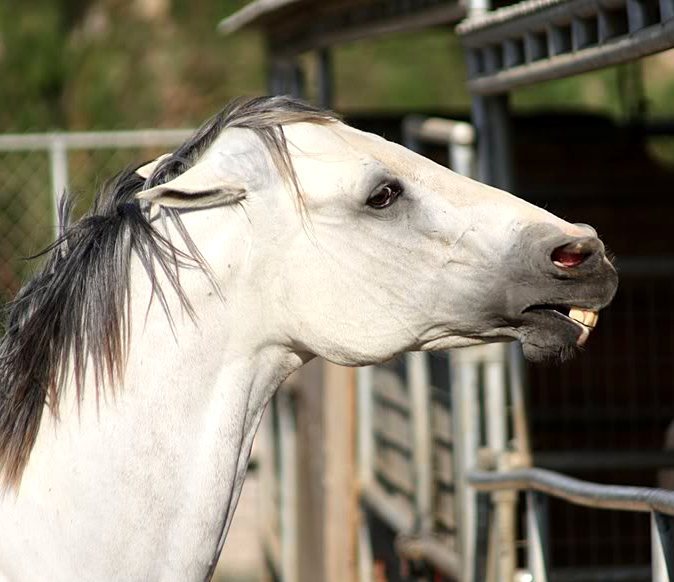
В отличие от многих других видов домашних животных, среди лошадей не встречаются породы с болтающимися или висячими ушами (это встречается только в виде редкой генетической мутации).
У большинства лошадей уши маленькие, в форме листьев. У некоторых лошадей кончики ушей слегка загнуты внутрь. У лошадей индийской породы марвари уши изогнуты настолько, что иногда они соприкасаются. Уши лошади расположены на самой верхней точке головы. Если в окрасе лошади присутствует темный цвет, края ушей обычно темные. У саврасых лошадей уши чаще всего двухцветные или целиком окрашены в темный цвет.
Слух у лошадей
Лошади очень хорошо слышат. Как и люди, они обладают способностью воспринимать несколько звуков одновременно. Когда лошадь к чему-то прислушивается, она поворачивает уши в сторону заинтересовавшего ее звука (если вы хотите посмотреть, как это выглядит – пошуршите пакетом с лакомством).
Диапазон звуков, которые слышат лошади, шире, чем у людей, и слух и них более тонкий. Именно по этой причине лошади порой пугаются чего-то, а всадник ничего не слышит. Обычно лошади не любят неожиданных или высоких звуков (таких, как свисток). Тонким слухом лошади обязаны чашевидной форме своего уха, а также возможность поворачивать уши в сторону звука.
Некоторые лошади сильнее реагируют на звуки, чем другие. Зачастую «пугливые» лошади – это именно те, кто уделяет много внимания необычным звукам. Именно по этой причине на выставках и шоу часто используются специальные затычки для лошадиных ушей. Это помогает животным сосредоточиться на задании.
Как и у людей, с возрастом слух у лошадей может ухудшиться. Лечения от возрастной потери слуха у лошадей пока не существует.
Язык ушей
У людей шевеление ушами – забавный фокус, которым можно рассмешить знакомых. У людей ушную раковину контролируют три мышцы. У лошадей их десять. Именно поэтому уши лошади – наиболее выразительная часть ее тела, при помощи которой она показывает свое настроение.
Если лошадь прижимает уши, это признак страха или агрессии, а возможно, и того, и другого одновременно. Если лошадь при вашем приближении прижимает уши, это означает то же самое, что и рычание собаки. Некоторые лошади имеют скверную привычку намеренно прижимать уши, чтобы дать человеку понять, что она не в настроении и отлынить от работы.
Уши, направленные вперед, означают радость или заинтересованность в чем-либо. Внимание лошади приковано к чему-либо или кому-либо впереди. По этой причине фотографы всегда пытаются заинтересовать лошадь каким-либо звуком, чтобы заставить ее «навострить уши».
Если лошадь находится под седлом, она часто шевелят ушами, либо одно из ушей наклонено вперед, а другое назад. Это означает только то, что животное прислушивается к наезднику.
И наконец, висящие или болтающиеся уши – это знак, на который необходимо обратить внимание. В большинстве случаев это означает, что лошадь устала и хочет спать. Повисшие уши дают вам понять: пора остановиться! Если у выставленной на продажу лошади висят уши, скорее всего, ей дали успокоительный препарат.
Кроме того, висящие уши могут быть знаком угнетенного состояния или депрессии животного (да-да, у лошадей бывает депрессия).
Наблюдение за ушами вашей лошади поможет понять ее настроение и общее состояние.
Здоровье ушей
Само собой разумеется, здоровье ушей лошади крайне важно и для самого животного, и для наездника.
Ухудшение слуха, связанное с возрастом, редко влияет на способность лошади к работе и езде. Именно поэтому пугливые лошади часто успокаиваются с возрастом, поскольку уже не слышат тревожащих их звуков. Обычно возрастные ухудшения слуха начинаются примерно лет в 15. Существуют специальные тесты, позволяющие проверить слух лошади.
Если лошадь полностью или частично потеряла слух, не стоит ездить с ней в одиночку (без других наездников) по маршрутам, так как она может не услышать предупреждающих звуков и испугаться, увидев что-то для себя неожиданное. Кроме того, такая лошадь может не услышать словесной команды своего наездника.
У лошадей крайне редко бывают ушные инфекции (намного реже, чем у собак и кошек). Паразитарные болезни встречаются значительно чаще. Если у лошади ушной клещ, она пытается тереться ушами о разные предметы, часто трясет головой и в целом становится раздражительной. Ушной клещ с трудом поддается диагностике, так как он живет в глубине уха. Лечить его тоже непросто. Если вы подозреваете, что у вашей лошади ушной клещ, обратитесь к ветеринару: он даст лошади успокоительный препарат и осмотрит ушной канал. В случае обнаружения клеща врач назначит специальные препараты. Чаще всего необходимо провести несколько курсов лечения, чтобы проблема не появилась вновь.
Некоторым лошадям особенно сильно докучают комары и мошки, вьющиеся вокруг ушей. Лучший метод борьбы с этим – специальная маска от насекомых, закрывающая уши. Также можно втирать (не брызгать!) в уши лошади репеллент перед тем, как выпустить ее из конюшни.
Чтобы оставить здесь комментарий, войдите или зарегистрируйтесь на сайте.
Авторизация